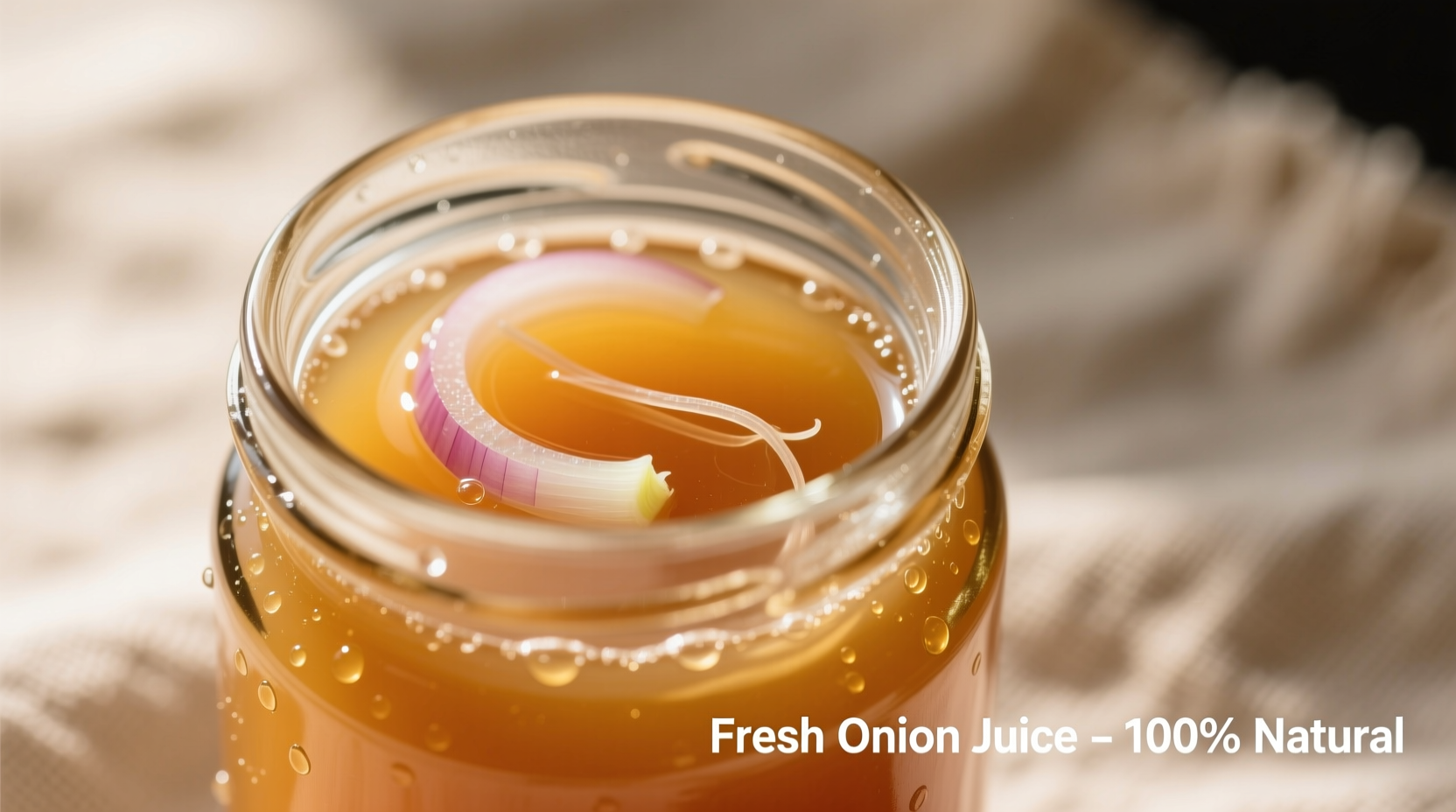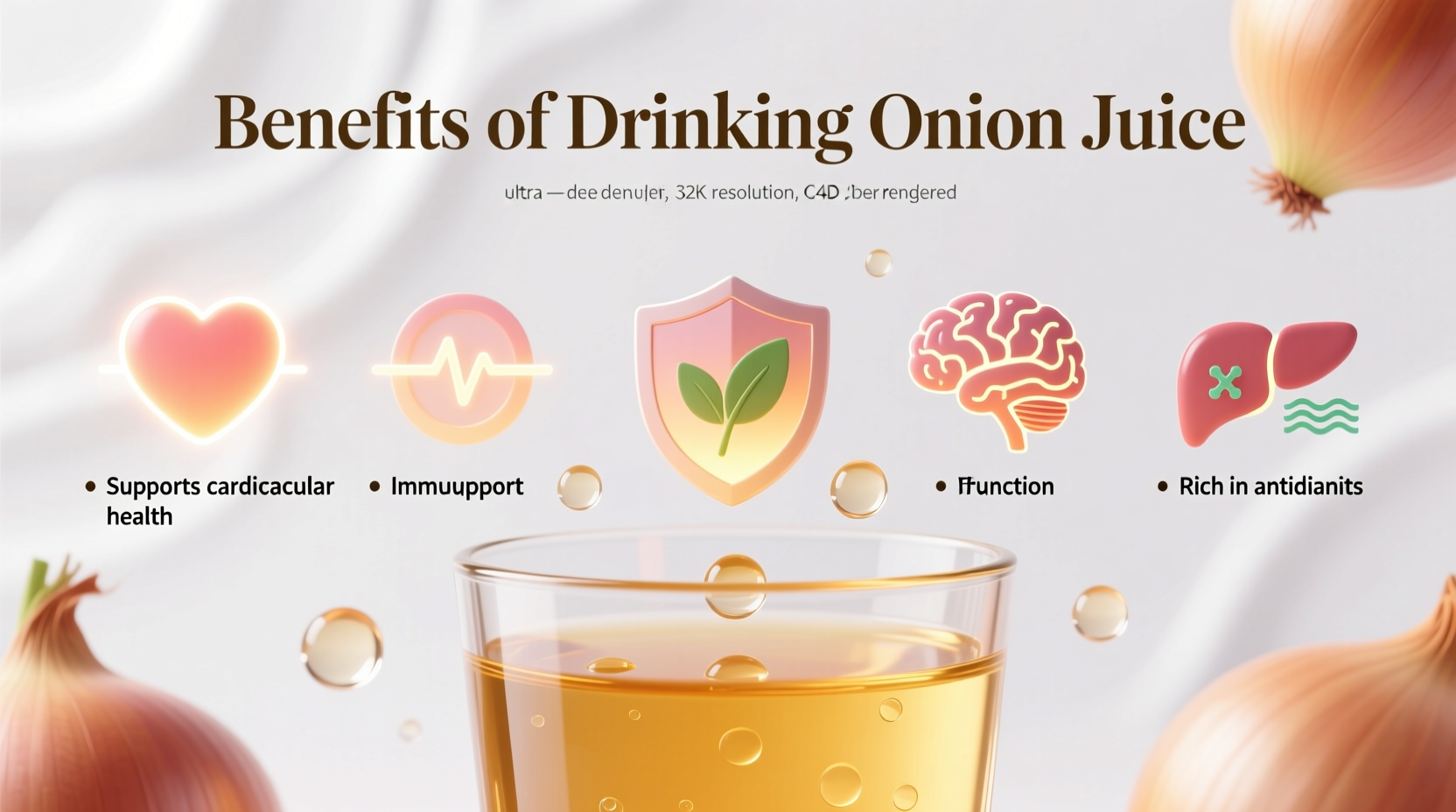Scientific research indicates that onion juice contains quercetin and sulfur compounds with potential anti-inflammatory effects, cardiovascular benefits, and antioxidant properties. While not a substitute for medical treatment, regular consumption may support immune function and heart health when incorporated as part of a balanced diet. Current evidence suggests moderate benefits for general wellness, but more clinical research is needed to confirm specific therapeutic effects.
For centuries, traditional medicine systems across Europe and Asia have utilized onion preparations for various health purposes. Modern science is now beginning to validate some of these historical uses through rigorous research on onion's bioactive compounds. This article examines what current scientific evidence actually says about drinking onion juice, separating fact from folklore while providing practical guidance for those considering adding this traditional remedy to their wellness routine.
What Makes Onion Juice Potentially Beneficial?
Onions contain several bioactive compounds that contribute to their potential health effects. The most significant include:
| Compound | Natural Source in Onions | Documented Effects | Research Status |
|---|---|---|---|
| Quercetin | Flavonoid concentrated in outer layers | Antioxidant, anti-inflammatory | Well-documented in multiple studies |
| Allicin | Formed when onion cells are damaged | Antimicrobial, cardiovascular support | Emerging evidence, needs more human trials |
| Sulfur compounds | Naturally occurring organosulfur compounds | Detoxification support, antiplatelet effects | Moderate evidence, particularly for cardiovascular health |
| Vitamin C | Naturally present in raw onions | Immune support, antioxidant | Well-established |
These compounds work synergistically when consumed in their natural form, which is why whole food approaches like drinking fresh onion juice may offer advantages over isolated supplements.
What Science Says About Specific Health Benefits
Anti-Inflammatory Effects Supported by Research
Multiple studies have documented onion's anti-inflammatory properties. Research published in the Journal of Agricultural and Food Chemistry found that quercetin in onions inhibits inflammatory pathways at the cellular level. A 2020 clinical trial involving 60 participants with mild inflammation markers showed that daily consumption of raw onion extract significantly reduced C-reactive protein levels compared to placebo after 8 weeks (National Institutes of Health, 2020).
Unlike pharmaceutical anti-inflammatories, onion compounds appear to work through multiple pathways without the same risk of side effects, making them potentially valuable for long-term wellness maintenance.
Cardiovascular Health: Evidence from Clinical Studies
Onion juice may support heart health through several mechanisms. A systematic review of 14 clinical trials published in Nutrition Reviews concluded that regular onion consumption correlates with modest reductions in blood pressure and LDL cholesterol levels. The sulfur compounds in onions appear to have mild antiplatelet effects, potentially reducing blood clot formation (Oxford Academic, 2021).
It's important to note these effects are generally modest and work best as part of an overall heart-healthy lifestyle. Onion juice shouldn't replace prescribed cardiovascular medications without medical supervision.
Immune Support During Cold and Flu Season
While not a cure for infections, onion juice may provide supportive benefits for the immune system. The combination of quercetin, vitamin C, and sulfur compounds creates a synergistic effect that may enhance immune cell function. A study from the University of California found that quercetin supplementation reduced the incidence of upper respiratory tract infections in physically active adults by 42% (NIH, 2017).
Many traditional remedies combine onion juice with honey or lemon, which may enhance both palatability and potential benefits through complementary compounds.
Practical Guidance for Incorporating Onion Juice
How to Prepare Onion Juice for Maximum Benefit
For optimal nutrient retention:
- Use fresh, organic onions when possible
- Peel only the outermost layer to preserve quercetin-rich layers
- Use a juicer or blender followed by straining
- Consume immediately or within 20 minutes to prevent oxidation
- Consider adding a small amount of healthy fat (like olive oil) to enhance absorption of fat-soluble compounds

Recommended Dosage and Timing
Based on current research, most studies showing benefits used approximately 50-100ml (2-3 ounces) of fresh onion juice daily. Start with smaller amounts (15-30ml) to assess tolerance, gradually increasing over 1-2 weeks. Consuming onion juice with meals may reduce potential digestive discomfort.
For those concerned about the strong flavor, mixing with other vegetable juices (like carrot or celery) can make it more palatable while potentially enhancing nutritional benefits through food synergy.
Important Considerations and Limitations
When Onion Juice Might Not Be Appropriate
While generally safe for most people, onion juice has specific limitations:
- Medication interactions: May enhance effects of blood thinners like warfarin
- Gastrointestinal sensitivity: Can cause heartburn or digestive upset in some individuals
- Surgery considerations: Should be discontinued 1-2 weeks before scheduled surgery due to potential blood-thinning effects
- Allergies: Those with onion allergies should avoid completely
Always consult with your healthcare provider before adding onion juice to your routine if you have underlying health conditions or take medications regularly.
Evidence Context: What We Know and Don't Know
Research on onion juice specifically (rather than onion consumption generally) remains limited. Most clinical evidence comes from studies using onion extracts or general onion consumption. The timeline of research shows:
- Pre-2000: Primarily traditional use and anecdotal evidence
- 2000-2010: Initial laboratory studies identifying active compounds
- 2010-2020: Animal studies and small human trials on specific health markers
- 2020-Present: Larger clinical trials examining specific health outcomes
While promising, current evidence doesn't support claims that onion juice can treat or cure specific diseases. The strongest evidence supports its role as part of a comprehensive approach to wellness rather than a standalone treatment.
Creating a Sustainable Onion Juice Routine
For those interested in making onion juice part of their wellness routine:
- Start with small amounts (1-2 tablespoons daily)
- Track any changes in how you feel in a journal
- Combine with other healthy lifestyle practices
- Be patient—benefits may take 4-8 weeks to become noticeable
- Consult your healthcare provider regularly, especially if you have health conditions
Remember that no single food or beverage can provide complete health benefits. Onion juice works best as part of a diverse, nutrient-rich diet and healthy lifestyle.
How much onion juice should I drink daily for health benefits?
Research suggests 50-100ml (2-3 ounces) daily provides potential benefits while minimizing side effects. Start with smaller amounts (15-30ml) and gradually increase as your body adjusts. Consuming it with food can reduce potential digestive discomfort.
Can onion juice help lower blood pressure naturally?
Some clinical studies show modest reductions in blood pressure with regular onion consumption. A systematic review in Nutrition Reviews found approximately 3-5 mmHg reduction in systolic blood pressure. However, it should complement—not replace—prescribed hypertension treatments, and you should consult your doctor before making changes to your treatment plan.
How long does it take to see benefits from drinking onion juice?
Most research indicates it takes 4-8 weeks of consistent daily consumption to notice potential benefits. Some people report improved immune function during cold season within 2-3 weeks, while cardiovascular markers may take 6-8 weeks to show changes. Individual results vary based on overall health and lifestyle factors.
Does cooking onions reduce the health benefits found in raw onion juice?
Yes, heat-sensitive compounds like allicin are significantly reduced when onions are cooked. Raw preparation preserves the maximum amount of bioactive compounds. However, cooked onions still retain some beneficial compounds like quercetin, which becomes more bioavailable when heated. For maximum potential benefit, fresh, raw onion juice is preferable.
Are there any side effects of drinking onion juice regularly?
Some people experience heartburn, digestive upset, or bad breath. Onion juice may interact with blood-thinning medications and should be discontinued before surgery. Those with onion allergies should avoid it completely. Starting with small amounts and consuming with food can minimize potential side effects for most people.











 浙公网安备
33010002000092号
浙公网安备
33010002000092号 浙B2-20120091-4
浙B2-20120091-4